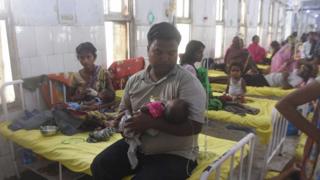 Image copyright
Image copyright
Getty Images
Hundreds of children have been admitted to hospital since the start of June
More than 90 children have died in an outbreak of suspected viral encephalitis in India’s Bihar state.
At least 200 patients, many of whom are below the age of 10, are still being treated at two hospitals.
State officials have said that many victims had died due to hypoglycaemia, or low blood sugar.
Thousands of children have died of encephalitis in Bihar and neighbouring Uttar Pradesh since the first case was detected in the late 1970s.
The Indian government has said that it will “extend all possible support” to the state and affected families.
The outbreak since the beginning of June has seen the most number of deaths in the city of Muzaffarpur.
The disease usually occurs during the monsoon season and children are the worst affected.
Until 2005, doctors say that the the majority of deaths were caused by Japanese encephalitis, a mosquito-borne virus.
But in the past decade or so, children have been dying of other forms of viral encephalitis and the exact cause of which is unclear.
- India encephalitis outbreak kills 400, mainly children
- Indian children died after ‘eating lychees on empty stomach’
The disease causes headaches and vomiting and can lead to coma, brain dysfunction, seizure and inflammation of the heart and kidney.
Doctors say children between the age of six months and 15 years are the worst affected and a fifth of the children who survive have to live with neurological weaknesses.
“It is difficult to say with certainty if children are dying due to encephalitis because there could be a number of reasons behind these deaths,” Dr Mala Kaneria told BBC Hindi’s Priyanka Dubey.
“It could also be due to malnutrition, insufficient levels of sugar and sodium or electrolyte imbalances.”
Dr Kaneria added that some of these deaths could also be caused by eating lychees on an empty stomach.
Lychees contain toxins that inhibit the body’s ability to produce glucose, which could affect young children whose blood sugar levels were already low because they were not eating dinner.
‘All I know is that my child was fine a day ago’
BBC Hindi’s Priyanka Dubey in Muzaffarpur
The thin glass door of the paediatric intensive care unit in the Shri Krishna Medical College cannot contain the sound of cries coming from inside.
Babia Devi was snivelling and crying as her five-year-old daughter, Munni, lay beside her in a corner inside the special ward.
Her mother, whose face is tear-stained, is convinced that her young daughter will not make it out of this hospital alive.
“The doctors have confirmed that Munni will not live. But I don’t know what happened to the Munni I knew – who was healthy and playful,” she tells me.
Neither she nor the doctors know what happened – they are unsure if Munni is a victim of encephalitis.
“All I know is that she was perfectly fine a day ago,” she says.
They rushed to the hospital from their village on Saturday after Munni awoke with burning fever.
“There has been no improvement in her condition. She hasn’t opened her eyes since we got to the hospital.”
At another hospital in Muzzaffarpur, the mood is just as sombre.
Four-year-old Tamanna Khatoon lay on a bed inside the intensive care unit at Muzzaffarpur Medical College.
Her mother, Ruby Khatoon, is sobbing outside the room.
“In the last two days, no child from this hospital has recovered. All of them have died,” she says.
“Did I painstakingly bring up this girl only to watch her die like this?”
In 2012, at least 390 people, mostly children, died in an outbreak of viral encephalitis in neighbouring Uttar Pradesh. More than 2,000 patients were admitted to hospital.
And in 2011, more than 460 people in northern India, mostly young children, died in one of the country’s worst outbreaks of encephalitis.
In 2005, a virulent outbreak of Japanese encephalitis in Gorakhpur in Uttar Pradesh killed 1,000 people, mostly children. This was the worst outbreak since 1978.
Encephalitis in India kills more than 90 children}

